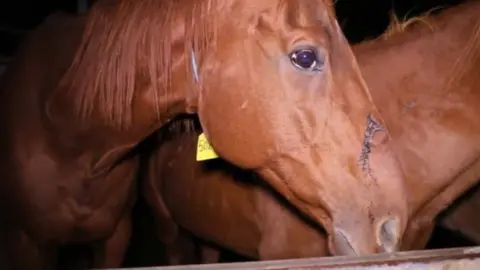Melbourne Cup: Will Australian racing overcome cruelty scandals?
 Getty Images
Getty ImagesAs Australia holds its most famous race, revelations of mistreatment of horses at an abattoir in Queensland have ignited coast-to-coast revulsion.
Last month allegations were aired that hundreds of registered racehorses are being sent to slaughterhouses in breach of racing rules and animal welfare guarantees.
The grim footage could not be further from the carnival and riches of Tuesday's Melbourne Cup, arguably Australia's most glittering sporting occasion.
The exposé by the Australian Broadcasting Corporation (ABC) and other scandals - including several recent race-day deaths - have dramatically escalated scrutiny of the sport.
Are Australian attitudes changing?
Shocking video
The abattoir footage, secretly gathered over two years, is pitiful and bloodthirsty. Abattoir workers are shown kicking horses in the head, attacking them with pipes and applying electric shocks to their genitals.
Trapped inside so-called "kill boxes", the horses can barely move, while other animals watch on, defenceless and grimly waiting their turn.
A member of staff is heard swearing at the horses, calling them "maggots" and shouting "you're going to... die here". Another appears to cheer on as one animal is despatched. Some of the condemned gallopers are under two years old.
 ABC 7.30
ABC 7.30In the background, saccharine pop music can be heard - a disarranged soundtrack to a sad end for animals who were once celebrated by punters across Australia.
Although not household names, Take A Chance, Rapid Feet and Moonlight Dancer won races and prize money for their owners before they disappeared. Some horse meat was reportedly sold for human consumption overseas.
A tipping point?
"We only rarely see our supporters and other concerned Australians react with such anger and outrage, as they have to this issue," Dr Bidda Jones, the acting head of RSPCA Australia, tells the BBC.
"This issue has significantly knocked Australian racing's reputation and blown a huge hole in their claims that horse welfare is paramount and racehorses are treated like kings. This should very much be viewed as a crisis and a tipping point for the industry."
The slaughter of thoroughbreds is legal in Australia, but regulations in some states require horses to be "rehomed", or given a chance to run free with families, farms or charities.

You might also be interested in:

But the brutality inflicted on the unwanted - officials call them "wastage" - is reportedly taking place every week, despite Racing Australia, the governing body, introducing a "traceability rule" in 2016 requiring the registration and tracking of all horses from birth to retirement.
"The horses are the stars of our sport and no-one will argue that they must be treated as such," said Brian Kruger, the chairman of Racing Victoria, a state body.
In response to the slaughterhouse scandal, it announced it would spend A$25m (£13m; $17m) to care for thoroughbreds from the stable to the grave.
"We understand that the development of a national database for all horses will be a complex matter. We welcome the opportunity to work with government to trial a pilot scheme for thoroughbreds."
What can the industry do?
Welfare campaigners argue that one of the fundamental problems is over-breeding. It is a scattergun, conveyor-belt policy of producing thousands of foals each year in the unrelenting search for a diamond in the straw.
Regulating or capping the number of newborns could be hard to enforce, but another radical move - banning the whip - is supported by activists and some sporting heavyweights.
 Getty Images
Getty Images"We need to change our training and racing practices to minimise the risk of injury which is a leading cause of premature retirement of horses, and, yes, this includes phasing out the routine use of whips, which use fear and pain to push horses beyond their capacity," said Dr Jones of RSPCA Australia.
Lloyd Williams, one of Australia's most successful thoroughbred owners, and a multiple Melbourne Cup champion, agrees.
He holds the record for the most Cup wins - six times - including most recently in 2017 with Rekindling, making him a prominent voice within the establishment.
"The industry now needs to realise whips need to be withdrawn very soon. They should be a world leader and be the first to do it," he told the ABC.
 Getty Images
Getty ImagesThe thoroughbred sector in Australia has faced other cruelty and race-fixing scandals. Ahead of this Melbourne Cup, many critics have noted that six horses since 2013 - all foreign runners - have died during or after the race.
Last year, animal rights activists staged protests outside the venue, Flemington Racecourse, and disrupted train services.
But Australians are also increasingly participating in smaller protests and boycotts, according to the Coalition for the Protection of Racehorses. The animal welfare group organises the Nup to the Cup campaign which calls on pubs and restaurants to hold anti-Melbourne Cup events instead of traditional - and often lucrative - celebrations. More than 25 such events were scheduled for Tuesday.
Additionally, celebrities including pop star Taylor Swift and Hollywood actress Lana Condor have generated much attention by cancelling scheduled appearances at the race this year. Both stars cited scheduling conflicts, but Condor also announced a donation to a horse welfare fund.
Eroding trust
The slaughter scandal is particularly damaging, according to Prof Paul McGreevy from the University of Sydney, who is a riding instructor and veterinarian.
"It eclipses all others in terms of graphic imagery but the damage may come chiefly from the story running to the core of whether the industry can retain the public's trust and its social licence to operate," he tells the BBC.
"The Australian public shall not forget the vision of the use of electric shocks to the genitals and horses receiving multiple captive bolt shots to the head."
Is it unthinkable that all of this could actually sink this mighty industry? For some, the threat is now existential.
Lee Freedman, a five-time Melbourne Cup winner, said only bold and wholesale reforms that guarantee animal welfare would be enough.
"If we don't make real changes the court of public opinion will bury racing," he tweeted.
